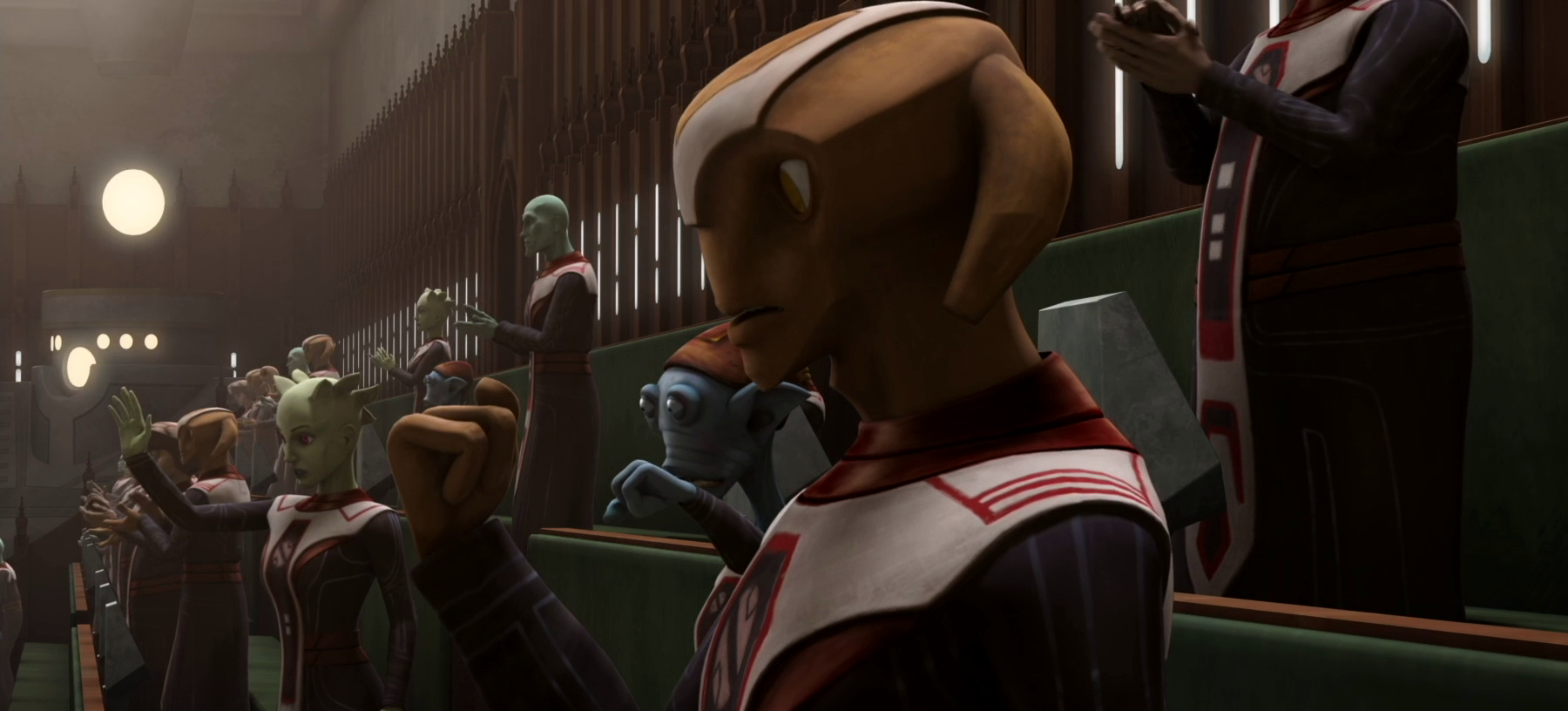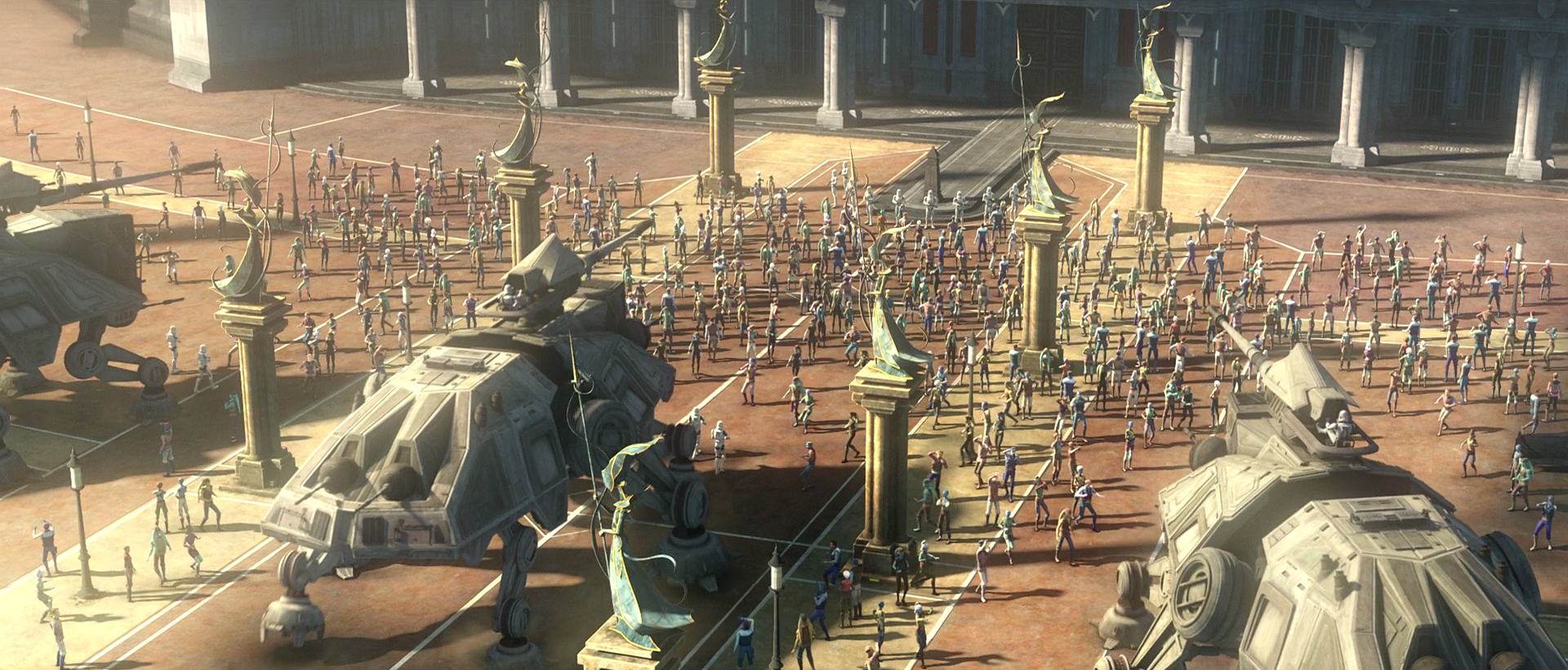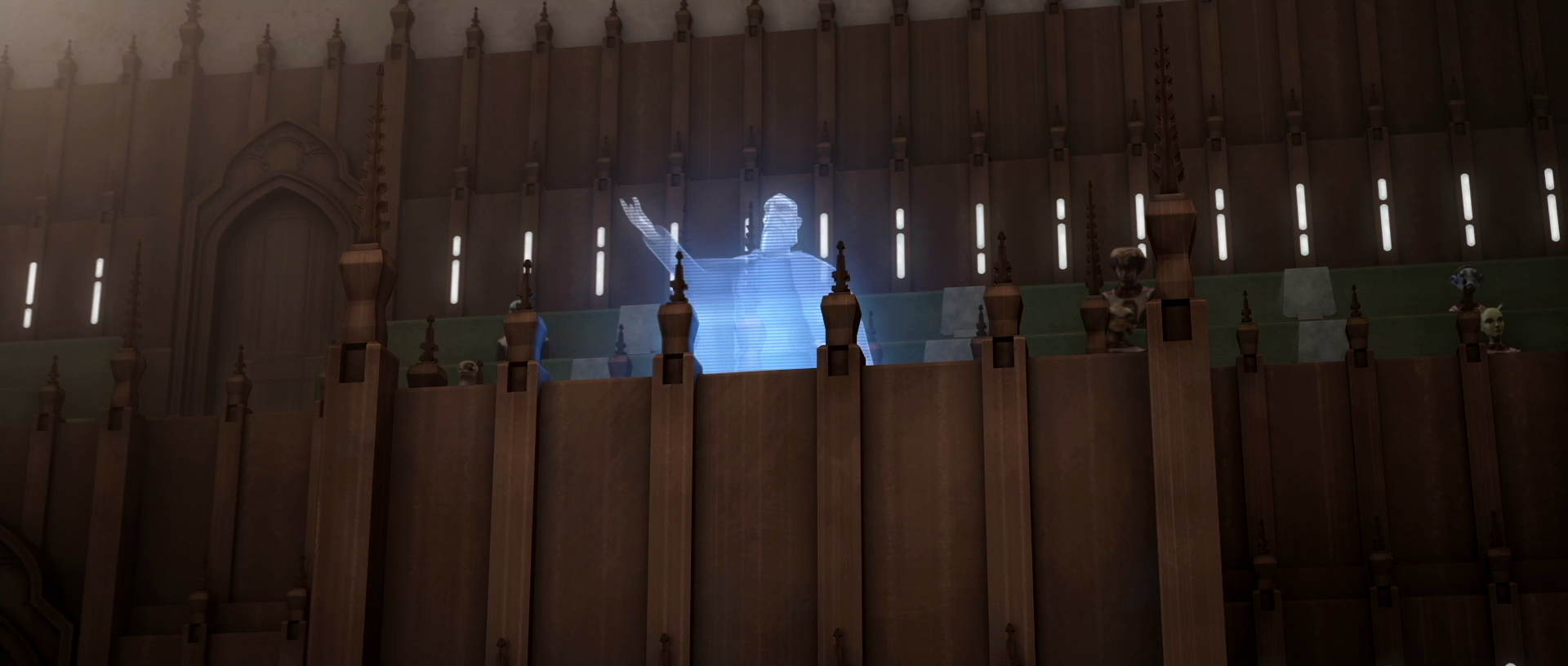Separatist Senate
The Separatist Senate, which was also known as the Separatist Parliament, the Legislative Senate, the Confederate parliament, and the Separatist Congress, functioned as the civilian legislative arm of the Confederacy of Independent Systems. This body represented countless member worlds during the Clone Wars and was comprised of senators from worlds aligned with the Separatists. In 24 BBY, when the charismatic Count Dooku established the Confederacy, the sectors and star systems that broke away from the Galactic Republic created their own congressional assembly to govern the nascent Separatist state. Many of the appointed delegates, who had previously been members of the Galactic Senate before the secession, continued to represent their constituents within the Confederacy. The Senate, operating under a written constitution known as the Bylaws of Independent Systems, was led by the Confederate Head of State, Dooku, and the Separatist Congress Leader Bec Lawise. Throughout the Clone Wars, the congressional body was based on the Confederate capital of Raxus Secundus, where it regularly met for sessions held in the Separatist Senate Building.
Although the Senate's representatives had some influence in state affairs, numerous aspects of the Separatist hierarchy often diminished their effectiveness. The corporate entities on the Separatist Council also participated in governmental decisions. Furthermore, Dooku, secretly the Dark Lord of the Sith Darth Tyranus, manipulated events to ensure the continuation of the galaxy-wide conflict for the benefit of the Sith. At times, the actions of other parties seeking to profit from the war nullified legislation passed by the Parliament, leading some to view the assembly's members as mere puppets of Dooku. Additionally, the senators of the Parliament and the citizens of the Confederacy were consistently kept in the dark about the brutal campaigns led by commanders of the Separatist Droid Army, such as General Grievous. Despite the Senate's involvement in public matters, the Confederacy was ultimately seen more as a movement than a fully centralized government.
History
Formation

Following the Raxus Address given by the charismatic ex-Jedi and Count of Serenno, Dooku, which condemned the Republic's corruption, the Confederacy of Independent Systems was initially established in 24 BBY. Thousands of dissatisfied star systems began to secede from the Republic in large numbers, withdrawing their representatives from the Galactic Senate on Coruscant and dispatching them to a new assembly on Raxus Secundus, which would serve as the new government's headquarters. Dooku and Senator By Bluss established this assembly, a civilian body of lawmakers, during the Clone Wars. Its purpose was to govern the growing number of Separatist worlds and manage civil affairs.
The Senate's members included former members of the Republic Senate and representatives from systems that had not previously been represented in galactic politics. Furthermore, the corporations that had backed Dooku's power grab also secured representation in the body.
During the Clone Wars

As the Clone Wars began, the body splintered into a wide spectrum of viewpoints, despite the fact that many senators had previously been members of the Rim Faction in the Republic Senate. The War Faction, under the leadership of Corporate Alliance Senator Voe Atell, aimed to intensify the war against the Republic, asserting that only complete victory would guarantee Confederate independence. The Peace Faction, initially headed by Japrael sector Senator Mina Bonteri, sought to end the conflict through negotiated peace and made multiple attempts to start negotiations with the Republic. Bonteri proposed a peace initiative in 21 BBY, which was created in partnership with Republic Senator Padmé Amidala. Despite opposition from Atell's War Faction and Senator Punn Rimbaud, the bill passed with a clear majority. However, Dooku plotted to ensure the proposal failed, orchestrating both an attack on Coruscant, which caused the Republic Senate to reject the offer, and the murder of Bonteri. In 20 BBY, the Parliament made another attempt at preliminary negotiations with Republic congresspeople at a peace conference held on the neutral world of Mandalore; however, these discussions also failed.
In 19 BBY, the Separatist Parliament recognized Rush Clovis as the new head of the InterGalactic Banking Clan, and Congress Leader Bec Lawise attended the transfer of power at the Banking Clan's headquarters on Scipio. Unbeknownst to Lawise and the Parliament, Dooku had engineered Clovis's rise and then attempted to forcefully annex Scipio into the Confederacy in order to seize control of the banks. Lawise protested that the Parliament would never approve such a move, prompting Dooku to use the Force to make Padmé Amidala kill the Speaker. Despite the Congress Leader's death, control of the banks ultimately reverted to the Republic.
Dissolution

After Dooku's death, the execution of the Separatist Council, and the de facto conclusion of the Clone Wars, the Separatist Senate was ultimately dissolved along with the rest of the Confederacy in 19 BBY.
Following the Clone Wars, Avi Singh, a senator from Raxus Secundus, was imprisoned by the Galactic Empire for speaking out against the occupation of Raxus, but Clone Force 99 later saved him. By 18 BBY, Singh told Senator Riyo Chuchi of the Imperial Senate that his former colleagues still desired true independence and that this desire had not diminished.
Organization and powers

The Siniteen Bec Lawise held the position of Speaker (also known as the Congress Leader) and presided over the Senate. While Speaker Lawise governed the Senate, Dooku, as Head of State, presided over the body's sessions. As detailed in the Bylaws of Independent Systems, the Separatist Senate was free from the outdated rules and protocols that hindered the Republic Senate, which were seen as contributing to the corruption that was common in the old system. Notably, the bylaws included provisions for voice votes, which were used during the motion for peace negotiations with the Republic.
Similar to the Republic Senate, the Separatist Senate was in charge of coordinating mutual defense and settling disputes between its members. However, unlike the Republic Senate, it delegated the majority of its authority over taxation and trade regulation to its member systems, in accordance with the Confederacy's decentralized ideology. As a result, the Senate only had temporary taxation powers to fund the war against the Republic.
In practice, Dooku frequently disregarded the Separatist Senate because he had been granted emergency wartime powers and executive power was vested in him and the officially advisory Separatist Council. Dooku's blatant disregard for the democratic process was evident in the annexation of Scipio, where Lawise's principled defense of parliamentary authority resulted in his death.